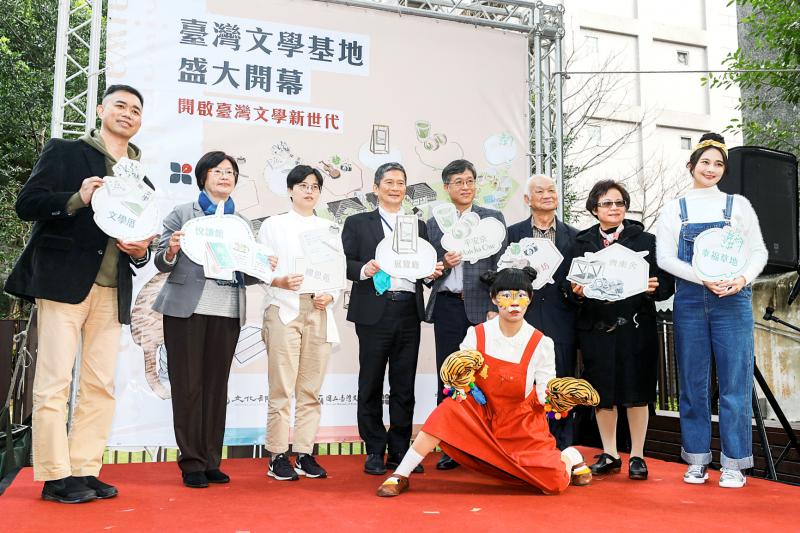The Taiwan Literature Base (臺灣文學基地), situated in the best-preserved Japanese colonial-era housing complex in Taipei, would be open to visitors from today, the Ministry of Culture said yesterday.
The newly restored site at No. 27, Jinan Rd Sec 2 in Zhongzheng District (中正) is an expansion of the Qi Dong Poetry Salon (齊東詩舍), which has been run by the Tainan-based National Museum of Taiwan Literature (NMTL) since July 2014, the ministry said.
The space, which consists of seven historical buildings occupying an area of 300 ping (992m2), would be a gathering place for authors, readers, publishers and critics, where creative energy would be concentrated, it said.

Photo: CNA
One of the buildings houses a permanent exhibition titled “The Birth of the Literature Base: A New Chapter of the Old Houses,” which details the site’s preservation, the ministry said.
Another is dedicated to children and picture books, as well as creative aging programs, it said.
One building, called the Muse Garden (繆思苑), would serve as the living and working quarters of the site’s writer-in-residence, with writer Yang Shuang-tzu (楊?子) to be the first to move in, it said.
The Literature House (文學厝) is to display a special exhibition titled “The NMTL’s Archive Select Exhibition,” after which it would hold professional exchanges, it said.
Two of the buildings would be used as additional spaces for exhibitions and activities, while the last houses dessert shop Matcha One, the ministry said.
At the opening ceremony yesterday, Minister of Culture Lee Yung-te (李永得) described the establishment of the space as an “important milestone,” and said he hoped that new works of literature would originate from it.
The new space in Taipei builds on the Tainan museum’s outreach programs and is aimed at serving audiences in the northern part of the nation, NMTL director Su Shuo-bin (蘇碩斌) said.
Su said that he looks forward to the new arts and culture site demonstrating to the public the vitality of Taiwanese literature.
The Taiwan Literature Base is open Tuesdays to Sundays from 10am to 6pm.

A group of Taiwanese-American and Tibetan-American students at Harvard University on Saturday disrupted Chinese Ambassador to the US Xie Feng’s (謝鋒) speech at the school, accusing him of being responsible for numerous human rights violations. Four students — two Taiwanese Americans and two from Tibet — held up banners inside a conference hall where Xie was delivering a speech at the opening ceremony of the Harvard Kennedy School China Conference 2024. In a video clip provided by the Coalition of Students Resisting the CCP (Chinese Communist Party), Taiwanese-American Cosette Wu (吳亭樺) and Tibetan-American Tsering Yangchen are seen holding banners that together read:

UNAWARE: Many people sit for long hours every day and eat unhealthy foods, putting them at greater risk of developing one of the ‘three highs,’ an expert said More than 30 percent of adults aged 40 or older who underwent a government-funded health exam were unaware they had at least one of the “three highs” — high blood pressure, high blood lipids or high blood sugar, the Health Promotion Administration (HPA) said yesterday. Among adults aged 40 or older who said they did not have any of the “three highs” before taking the health exam, more than 30 percent were found to have at least one of them, Adult Preventive Health Examination Service data from 2022 showed. People with long-term medical conditions such as hypertension or diabetes usually do not

POLICE INVESTIGATING: A man said he quit his job as a nurse at Taipei Tzu Chi Hospital as he had been ‘disgusted’ by the behavior of his colleagues A man yesterday morning wrote online that he had witnessed nurses taking photographs and touching anesthetized patients inappropriately in Taipei Tzu Chi Hospital’s operating theaters. The man surnamed Huang (黃) wrote on the Professional Technology Temple bulletin board that during his six-month stint as a nurse at the hospital, he had seen nurses taking pictures of patients, including of their private parts, after they were anesthetized. Some nurses had also touched patients inappropriately and children were among those photographed, he said. Huang said this “disgusted” him “so much” that “he felt the need to reveal these unethical acts in the operating theater

Heat advisories were in effect for nine administrative regions yesterday afternoon as warm southwesterly winds pushed temperatures above 38°C in parts of southern Taiwan, the Central Weather Administration (CWA) said. As of 3:30pm yesterday, Tainan’s Yujing District (玉井) had recorded the day’s highest temperature of 39.7°C, though the measurement will not be included in Taiwan’s official heat records since Yujing is an automatic rather than manually operated weather station, the CWA said. Highs recorded in other areas were 38.7°C in Kaohsiung’s Neimen District (內門), 38.2°C in Chiayi City and 38.1°C in Pingtung’s Sandimen Township (三地門), CWA data showed. The spell of scorching